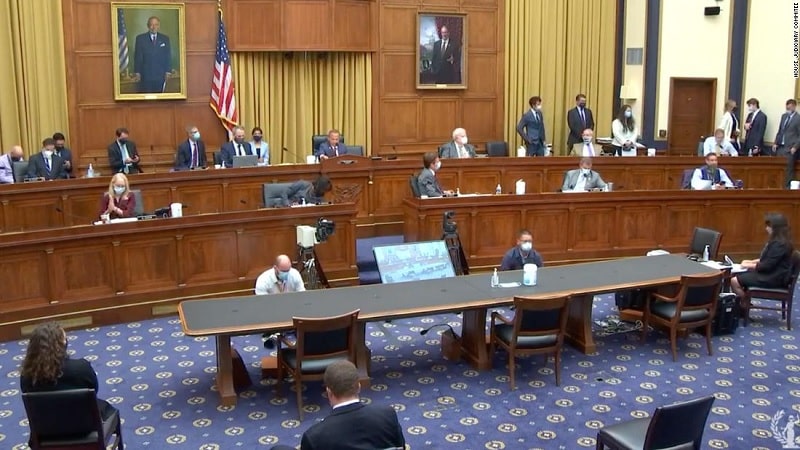
During a high-profile hearing that focused largely on antitrust issues, members of the House Judiciary Antitrust, Commercial, and Administrative Law Subcommittee on July 29 also grilled four major tech company CEOs on a range of other policy issues including privacy and misinformation.
The questioning at yesterday’s hearing – which featured as witnesses Alphabet CEO Sundar Pichai, Apple CEO Tim Cook, Facebook CEO Mark Zuckerberg, and Amazon CEO Jeff Bezos – also included a smattering of mostly partisan complaints about online censorship, and the companies’ work with China.
On the privacy front, lawmakers expressed concern about how the companies handle user data – specifically how data is used by the platform collecting it, how it is being shared with third-party companies, and how it is shared with all levels of government.
While U.S. lawmakers continue their years-long debate on the merits of new data privacy laws, major tech companies already have to comply with the European Union’s General Data Privacy Regulation (GDPR) framework. Congressional leaders questioned the companies’ compliance with the framework and its impact on both large and small businesses.
Pichai said that “to the best of my knowledge” Alphabet and Google were in full compliance with GDPR. He added, “Our utmost care is ensuring the privacy and security of our users.”
Rep. Kelly Armstrong, R-N.D., delved into concerns regarding geofence warrants, which compel technology companies to provide user records for any devices in a specific area at a particular time. Rep. Armstrong noted that Google saw a 1,500 percent increase in geofence requests from 2017 to 2018 and a 500 percent increase in requests from 2018 to 2019. Rep. Armstrong asserted that these types of warrants violate the Fourth Amendment, which mandates probable cause. Because the geofence warrants cover anyone in a particular area, he argued that they lack probable cause.
The congressman said he believes location data collected by companies such as Google should be considered as content protected by the Electronic Communications Privacy Act of 1986 (ECPA) and the Stored Communications Act provisions within ECPA.
In that case, the statute would prevent law enforcement from being able to broadly demand user data based on the location of devices. Rep. Armstrong asked if Pichai agreed with him, and Pichai demurred on answering the question directly – saying he was happy to engage with the subcommittee further on the matter. But, he emphasized that transparency is a top goal for Google, that the company has begun automatically deleting user location data after a certain period of time. He further said that it was an “important area” for congressional regulation.
Rep. Armstrong said that most people would be “terrified” to learn that law enforcement could gather everyone’s data just based on location and said it was perhaps “the most important issue” facing the subcommittee. He said dealing with it would require both congressional action, as well a commitment to act by the four CEO witnesses.
With less than 100 days until the 2020 General Election, lawmakers unsurprisingly asked about how tech platforms treat information related to the election. The majority of subcommittee members had questions for Pichai and Zuckerberg about how their platforms react to political messages. Chief among concerns for GOP members was censorship or demonization of conservative posters and publications. Meanwhile, Democrats seemed largely concerned with the sharing of misinformation.
A similar split arose with information regarding COVID-19. Specifically, Rep. Greg Steube, R-Fla., referenced videos regarding the use of hydroxychloroquine to cure COVID-19 being removed from YouTube, while videos posted by protestors showing violence remained available. Pichai defended YouTube’s stance on free speech and said it did allow for in-depth conversations around ways to react to COVID-19. But he said that during a pandemic, YouTube listens to the CDC for guidelines on medical misinformation, and said the company would remove videos that promote potentially dangerous “cures” or treatments.
Rep. David Cicilline, D-R.I., interrogated Zuckerberg over the prevalence of misinformation on Facebook, and argued that Facebook allows misinformation to flourish on its platform because it is profitable. Zuckerberg responded that Facebook has measures in place to identify and remove misinformation on its site, and denied that misinformation was “good for business.”
Cicilline specifically addressed a video from Breitbart that said hydroxychloroquine is a cure for COVID and that masks are unnecessary to prevent virus spread. He noted that the video received 20 million views in the five hours it took Facebook to remove it. He asked, “Doesn’t that suggest, Mr. Zuckerberg, that your platform is so big that even with the right policies in place, that you can’t contain deadly content?” Zuckerberg rejected that idea, and stressed that Facebook removes misinformation, and has set up a COVID information resource center.
Rep. Mary Scanlon, D-Penn., also addressed Alphabet acquiring YouTube, and its impact on consumer data privacy. Specifically, Scanlon had questions about YouTube knowingly violating Federal law to collect data from children under 13 and allowing advertisers to use that data to target children. Pichai didn’t address Scanlon’s question head-on, instead, he commented on YouTube’s commitment to follow Federal policies as well as its investments in ensuring YouTube kids is a safe platform for children.
